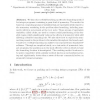Free Online Productivity Tools
i2Speak
i2Symbol
i2OCR
iTex2Img
iWeb2Print
iWeb2Shot
i2Type
iPdf2Split
iPdf2Merge
i2Bopomofo
i2Arabic
i2Style
i2Image
i2PDF
iLatex2Rtf
Sci2ools
100
click to vote
IPCO
2007
2007
Orbital Branching
We introduce orbital branching, an effective branching method for integer programs containing a great deal of symmetry. The method is based on computing groups of variables that are equivalent with respect to the symmetry remaining in the problem after branching, including symmetry which is not present at the root node. These groups of equivalent variables, called orbits, are used to create a valid partitioning of the feasible region which significantly reduces the effects of symmetry while still allowing a flexible branching rule. We also show how to exploit the symmetries present in the problem to fix variables throughout the branch-andbound tree. Orbital branching can easily be incorporated into standard IP software. Through an empirical study on a test suite of symmetric integer programs, the question as to the most effective orbit on which to base the branching decision is investigated. The resulting method is shown to be quite competitive with a similar method known as isom...
| Added | 29 Oct 2010 |
| Updated | 29 Oct 2010 |
| Type | Conference |
| Year | 2007 |
| Where | IPCO |
| Authors | James Ostrowski, Jeff Linderoth, Fabrizio Rossi, Stefano Smriglio |
Comments (0)

